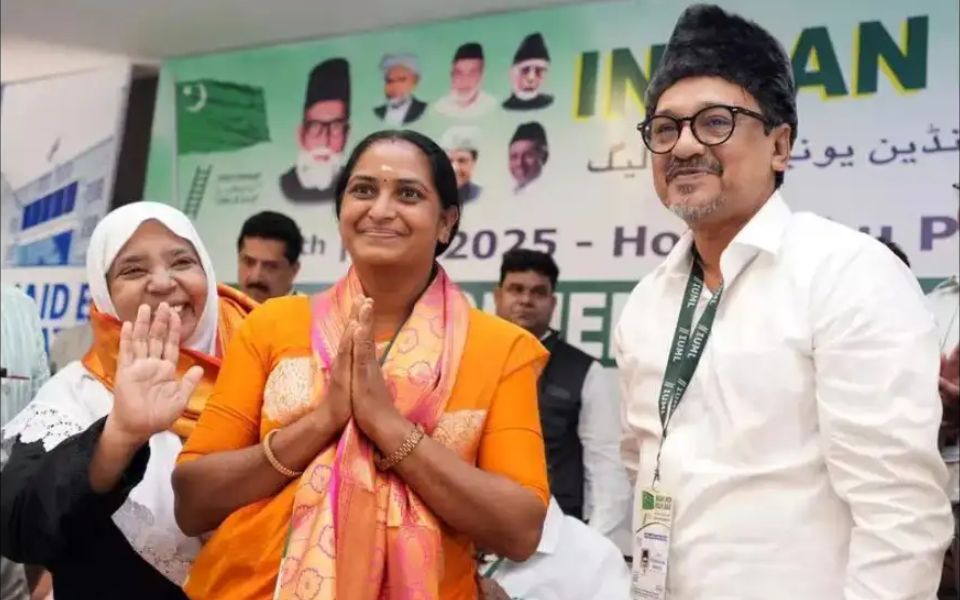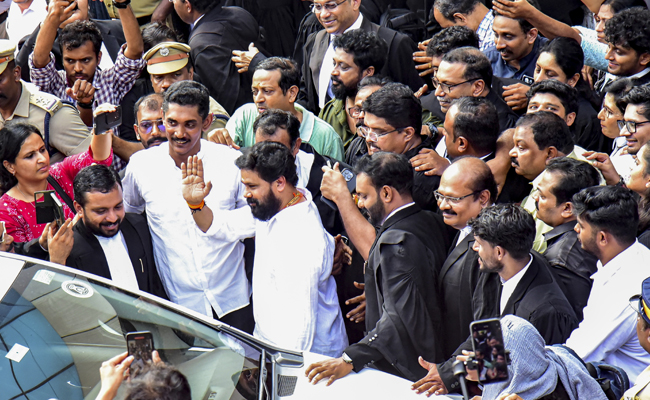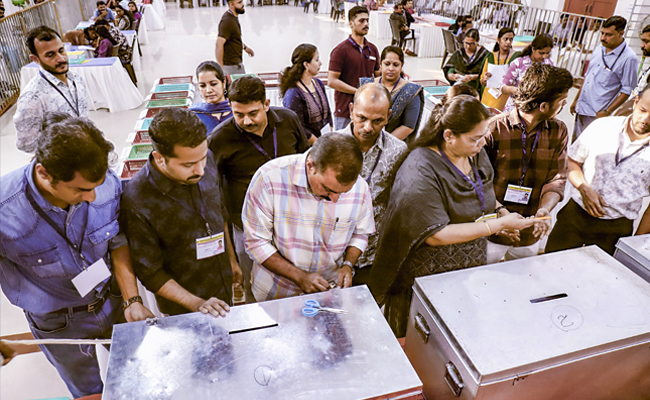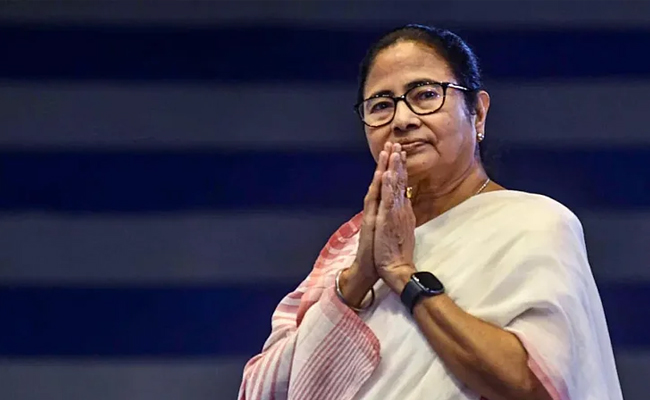Wayanad, Kerala – In a significant move aimed at addressing long-standing criticism over lack of representation, the Indian Union Muslim League (IUML) appointed two women – Jayanthi Rajan from Kerala and Fathima Muzaffar from Tamil Nadu – as national office-bearers. This is the first time in IUML’s history that women have been appointed to national-level leadership positions.
The announcement was made during the party’s National General Council meeting held on Thursday, signalling a major shift in IUML's approach towards inclusivity, especially concerning gender, caste, and religious diversity.
46-year-old Jayanthi Rajan, a Dalit leader from Irulam in Wayanad, Kerala, has been a long-time associate of the party. Her political journey with IUML began in 2008 through her involvement with the Women’s League. She formally became a member of the party in 2010 and has since held several key posts, including National General Secretary of the Women’s League and State President of the Dalit League (Women).
Her entry into electoral politics was marked by a victory in 2010 from the Puthadi Panchayat, a women-reserved seat. She also served as the Standing Committee Chairperson of the Panamaram Block Panchayat.
Coming from a Congress-leaning family, Jayanthi was actively involved with Shreyas, a social service organisation in Sultan Bathery. It was through this platform that she first began collaborating with the Muslim League’s social initiatives.
“This came as a totally unexpected choice,” Jayanthi said while speaking to Onmanorama on her return to Wayanad. She also expressed gratitude to the party for their support. “People may call the League a communal party, but that’s absolutely wrong. This is not a party based solely on religion. They have always treated me like a dear sister,” she added.
Jayanthi credits her father-in-law, Irulath Ramankutty, a former president of the Bathery Block Panchayat, for motivating her to join the League. Her husband Rajan and their children are also active IUML members. Her son is a software engineer while her daughter is pursuing a BDS degree.
Despite not being able to continue her studies after Class XII, Jayanthi enrolled for a BA in Sociology from IGNOU four years ago. Although family responsibilities delayed her academic journey, she remains committed to completing the course.
IUML’s decision to appoint women at the national level comes amid increasing pressure over its handling of gender-related issues. The party had faced backlash in 2021 for disbanding the Haritha State Committee after its leaders raised complaints about misogynistic remarks by male counterparts in the Muslim Students Federation (MSF). While the committee was later reconstituted, the incident sparked debate over the party’s approach to women’s participation.
Disciplinary action against former Haritha members was withdrawn in 2024, and they were offered key positions in the Muslim Youth League – a development seen as an attempt to heal internal divisions.
Speaking about the Haritha controversy, Jayanthi remained cautious but optimistic. “It was the wish of the youth. Even if ideological differences exist, we will bring everyone under the party’s umbrella. They are the future of the Women’s League,” she said.
IUML has historically fielded very few women candidates. Noorbina Rasheed’s candidacy in the 2021 Kozhikode Assembly election came after a 25-year gap since Qamarunnisa Anwar contested in 1996.
Jayanthi sees her appointment not just as personal recognition but as part of a broader shift within the IUML. “This is a party decision. We will stand by the party’s decisions and move forward together,” she said.
Let the Truth be known. If you read VB and like VB, please be a VB Supporter and Help us deliver the Truth to one and all.
Kochi (PTI): The prosecution had "miserably" failed to prove the conspiracy charge against Dileep in the sensational 2017 actress sexual assault case, a local court has observed while citing inconsistencies and lack of sufficient evidence against the Malayalam star.
The full judgement of Ernakulam District and Principal Sessions Court Judge Honey M Varghese was released late on Friday, and has revealed the judge also pointing out at unsustainable arguments put forth by the prosecution.
"The prosecution miserably failed to prove the conspiracy between accused No.1 (Pulsar Suni) and accused No.8 (Dileep) in executing the offence against the victim," the court held.
It examined in detail, the prosecution's allegation that Dileep had hired the prime accused to sexually assault the survivor and record visuals, including close-up footage of a gold ring she was wearing, to establish her identity.
On page 1130 of the judgment, under paragraph 703, the court framed the issue as whether the prosecution's contention that NS Sunil (Pulsar Suni) recorded visuals of the gold ring worn by the victim at the time of the occurrence, so as to clearly disclose her identity, was sustainable.
The prosecution contended Dileep and Suni had planned the recording so that the actress' identity would be unmistakable, with the video of the gold ring intended to convince Dileep that the visuals were genuine.
However, the court noted that this contention was not stated in the first charge sheet and was introduced only in the second one.
As part of this claim, a gold ring was seized after the victim produced it before the police.
The court observed that multiple statements of the victim were recorded from February 18, 2017, following the incident, and that she first raised allegations against Dileep only on June 3, 2017.
Even on that day, nothing was mentioned about filming of the ring as claimed by the prosecution, the court said.
The prosecution failed to explain why the victim did not disclose this fact at the earliest available opportunities.
It further noted that although the victim had viewed the sexual assault visuals twice, she did not mention any specific recording of the gold ring on those occasions, which remained unexplained.
The court also examined the approvers' statements.
One approver told the magistrate that Dileep had instructed Pulsar Suni to record the victim's wedding ring.
The court observed that no such wedding ring was available with her at that time.
During the trial, the approver changed his version, the court said.
The Special Public Prosecutor put a leading question to the approver on whether Dileep had instructed the recording of the ring, after which he deposed that the instruction was to record it to prove the victim's identity.
The court observed that the approver changed his account to corroborate the victim's evidence.
When the same question was put to another approver, he repeated the claim during the trial but admitted he had never stated this fact before the investigating officer.
The court noted that the second approver even went to the extent of claiming Dileep had instructed the execution of the crime as the victim's engagement was over.
This showed that the evidence of the second approver regarding the shooting of the ring was untrue, as her engagement had taken place after the crime.
The court further observed that the visuals themselves clearly revealed the victim's identity and that there was no need to capture images of the ring to establish identity.
In paragraph 887, the court examined the alleged motive behind the crime and noted that in the first charge sheet, the prosecution had claimed that accused persons 1 to 6 had kidnapped the victim with the common intention of capturing nude visuals to extort money by threatening to circulate them and there was no mention about Dileep's role in it.
The court also rejected the prosecution's claim that the accused had been planning the assault on Dileep's instructions since 2013, noting that the allegation was not supported by reliable evidence.
It similarly ruled out the claim that Suni attempted to sexually assault the victim in Goa in January 2017, stating that witness statements showed no such misconduct when he served as the driver of the vehicle used by the actress there.
The court also discussed various controversies that followed Dileep's arrest and the evidence relied upon by the prosecution, ultimately finding that the case had not been proved.
Pronouning its verdict on the sensational case on December 8, the court acquitted Dileep and three others.
Later, the court sentenced six accused, including the prime accused Suni, to 20 years' rigorous imprisonment.
The assault on the multilingual actress, after the accused allegedly forced their way into her car and held it under their control for two hours on February 17, 2017, had shocked Kerala.
Pulsar Suni sexually assaulted the actress and video recorded the act with the help of the other convicted persons in the moving car.





